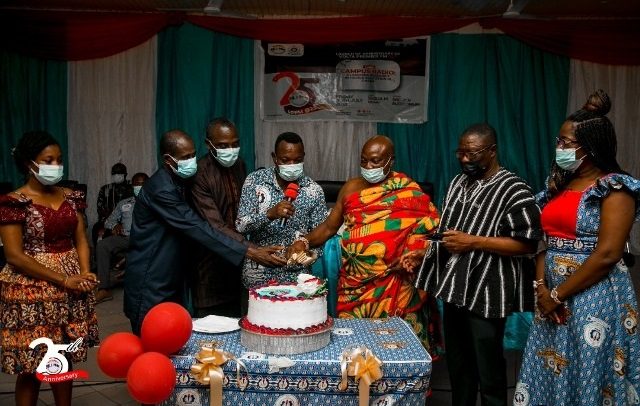Chairman of the Campus Broadcasters Association, Dr Sidick Ahmed, says funding is a major challenge for campus radio stations and that dedicated efforts are needed to keep them relevant.
He said despite being a “panoramic education resource”, and breaking the “monopoly” of State broadcasting right after the promulgation of the 1992 Constitution, campus radio stations continued to hold on to a thin line of survival provided by students annual contributions, community announcements, fundraisers and sponsorship by the donor agencies and media-related organizations, including UNESCO.
Dr Ahmed made the call when he delivered an address at the launch of the 25th Anniversary Celebrations of Volta Premier FM, campus Radio of the Ho Technical University.
He said aside from the crucial role as “laboratories” with several uses, including learning platforms, intra-campus communication and broadcasting training opportunities, the campus radio, in the country is a “trailblazer of creative programming concept”, and thus its growth must become a priority for stakeholders.
“Campus radio was the first to introduce in-depth national discourse with instantaneous feedback from students, lecturers, experts politicians and the public on several matters of national and community importance,” Dr Ahmed, who also is the Manager of Radio Universe, campus broadcaster of the University of Ghana, stated, noting how campus radio pioneered the newspaper review concept, which had been absorbed into radio programming across the country.
He said campus radio also held credit as a forerunner of local language programming on private independent media, and that its replication in local languages “democratized expression and gave voice and power to the voiceless.
“This transformed entirely the broadcasting landscape in terms of politics and other important matters such as policy-making.
The main challenge of campus radio is funding and financing of infrastructure, equipment, logistics, and operations, especially cost of programming,” he said.
Dr Ahmed added, “The problem is huge. The universities do not have what it takes to actually finance the needs financially of campus radio stations. So the question now is, must campus radio stations go commercial? How safe is that? Or continue to be offering public service and community service with the limited resources that they have?”
Dr Ahmed said collaborations with industry could be explored as a way of funding campus radio stations, adding that the HTU, with its engineering department, could position itself to produce broadcasting equipment standardised for use in the tropics.
He said campus radio could help broaden the scope of language research, as well as contribute to the transformation of the artisanal space and provide the needed human resource for the growth of the nation.
Dr Ahmed said campus radio remained a resource for learning in higher education although not “properly developed” due to the lack of national and institutional policy, which he said must be considered, and called on journalism teaching institutions to recognise the needs.
He said stakeholders, including the government, must work together to provide the needed transformation, which he said could be considered within the current digitization agenda.
“A recognition of this reality and an effective collaboration between government, institutions of higher learning and other stakeholders could stimulate the transformation needed for the development of the country’s human resource in this regard.
“I believe this could be a separate project in the current digitisation programme led by the Vice President Dr Alhaji Mahamoud Bawumia,” he said.
Volta Premier FM began in 1995, when a group of students produced a transmitter with a 200-meter radius, and in July 1996, was established as the first radio station in the Volta Region.
Manager of the radio station, Esther Naa Ajele Sowah, described the pioneers as “daring”, and said the support of the various managerial boards of the University helped the station deliver on its mandate as the main broadcaster.
Vice Chancellor of the HTU, Professor Benjamin Honyenuga, launching the anniversary, said “what began as a small dream is impacting lives and playing a pivotal role in the media landscape in Ho and the Volta Region as a whole”.
He said the radio station remained the competition in the Volta and Oti Regions and trained several competent professionals through student volunteering programmes.
The VC said the University’s management was redesigning the station, incorporating it into the public affairs unit and standardizing its accounts structure, and would hook it onto its power grid for uninterrupted supply.
Prof. Honyenuga said the radio would disseminate information to farmers in the Region, and therefore, appealed to the National Communication Authority to permit transmission beyond the Region.
Chairman of the Volta and Oti Chapter of the Ghana Journalists Association, Anthony Bells Kafui Kanyi, said the media landscape in the region had benefited from the “many” talents produced by the radio outlet.
He said the station maintained high standards of professionalism both on and off the field and became a household radio, which kept the Region alive, and therefore appealed to the management of the HTU to consider a program in media communication.
The anniversary is being marked by a series of activities including the hosting of radio programmes by employees and board members, which would provide free airtime for clients, blood donations, a food bazaar, and a grand durbar.
GNA


